Perdue Farms Bundle
Who Really Owns Perdue Farms?
Understanding the ownership structure of a major company like Perdue Farms is crucial for grasping its strategic direction and market influence. With a recent leadership transition, the question of who controls this agricultural giant becomes even more pertinent. Founded in 1920, Perdue Farms has evolved from a small egg business into a leading poultry and pork producer, making its ownership structure a key factor in its operations.
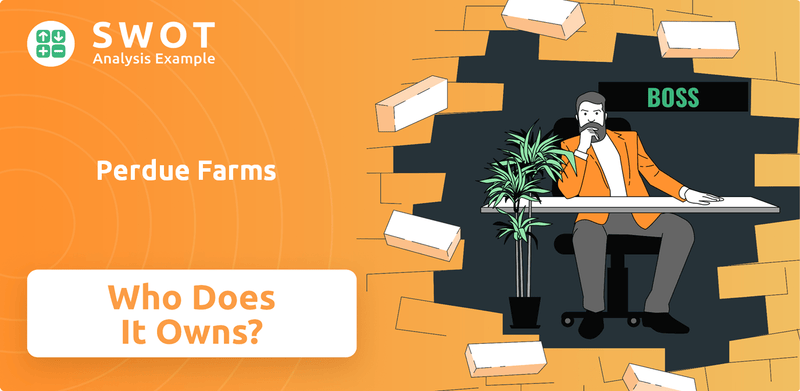
This exploration into Perdue Farms SWOT Analysis will uncover the intricacies of Perdue ownership, tracing its evolution from the founder's initial stake to the current family control. We'll examine the Perdue family's influence, the company's private status, and how these factors shape its approach to corporate governance and long-term strategic planning. Discover the impact of being a family-owned entity on the company's commitment to responsible food production and its ability to adapt to changing consumer demands. Learn about the Perdue company's history and its key executives.
Who Founded Perdue Farms?
The story of Perdue Farms, a major player in the poultry industry, begins in 1920 with Arthur Perdue. He started the business with a simple venture: selling eggs from his backyard flock. This marked the inception of what would become a significant enterprise in the food sector.
Initially, the ownership of Perdue Farms was straightforward and entirely within the family. Arthur Perdue held 100% of the company. His son, Frank Perdue, later joined the business in 1939, playing a crucial role in its evolution from a local egg provider to a large-scale broiler producer. The company's growth was fueled by reinvested earnings, with no external investors during its early stages.
As the business expanded, the Perdue family maintained control, and ownership remained concentrated within them. The company's structure reflects a commitment to quality and direct control over the production process, a characteristic that continues to define the brand. The early years saw no public reports of major ownership disputes, indicating a smooth transition of control within the family.
Arthur Perdue founded Perdue Farms in 1920. The company started as a backyard egg business.
Frank Perdue joined in 1939, significantly impacting the company's growth. The Perdue family maintained ownership throughout the early years.
Arthur Perdue initially held 100% ownership. The company's growth was primarily self-funded.
The company focused on direct control over production. This included feed mills and processing plants.
Early agreements likely focused on intergenerational transfer. There were no public reports of major ownership disputes.
The emphasis on quality and control remains central. This is a key part of the Perdue Farms brand.
The Perdue ownership structure has been a key factor in the company's long-term success. The Perdue family's commitment to quality and control has shaped the brand's identity. The company's history reflects a focus on maintaining family control, which has allowed for a consistent approach to business operations. The early years of the Perdue company were marked by self-financing and a strong emphasis on vertical integration. The Perdue chicken business has grown significantly over the years. If you are interested in learning more about the company, you can read this article about 0.
The initial ownership of Perdue Farms was entirely within the Perdue family, with Arthur Perdue as the founder.
- Arthur Perdue's initial ownership was 100%.
- Frank Perdue's role was crucial in expanding the business.
- The company's growth was financed through reinvested earnings.
- The focus was on quality and direct control over production.
Perdue Farms SWOT Analysis
- Complete SWOT Breakdown
- Fully Customizable
- Editable in Excel & Word
- Professional Formatting
- Investor-Ready Format
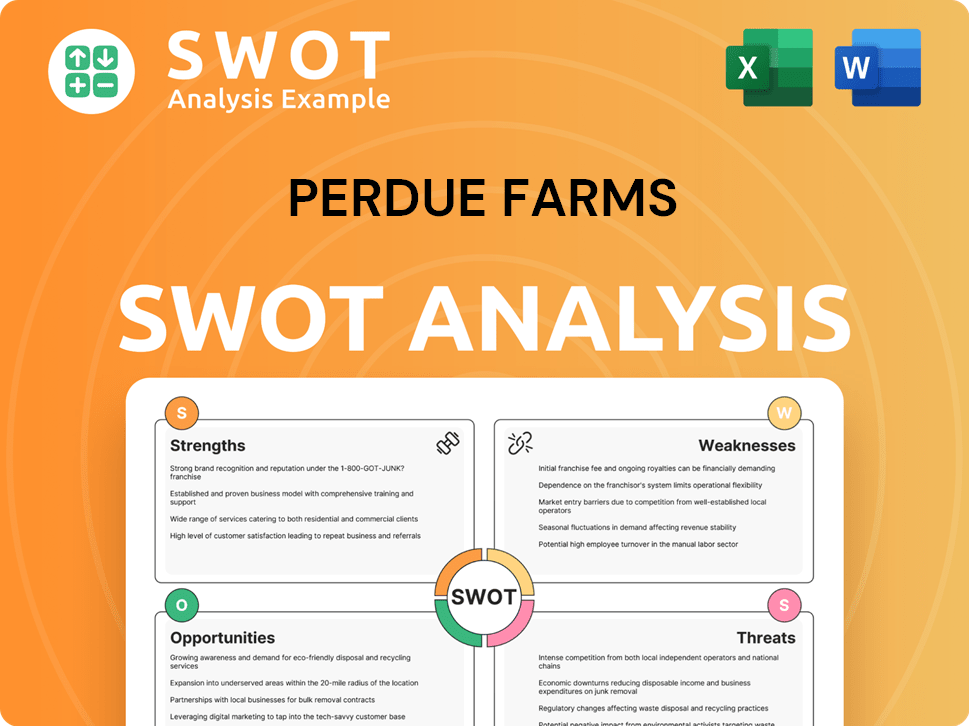
How Has Perdue Farms’s Ownership Changed Over Time?
The ownership of Perdue Farms, a company synonymous with poultry, has been a story of family continuity. Founded by Arthur Perdue, the company's control has primarily remained within the Perdue family. This contrasts with many competitors that are publicly traded. Frank Perdue, Arthur's son, significantly expanded the business. Later, Jim Perdue, Frank's son, took over, continuing the family's legacy. The evolution of Perdue ownership is marked by generational transfers, not public offerings or external investments.
Currently, the Perdue family maintains substantial control through trusts and direct holdings. While specific ownership percentages aren't disclosed, the family's influence is clear. In 2023, Kevin McAdams became CEO, the first non-family member to hold the position, yet the family's ownership structure remained unchanged. Jim Perdue transitioned to Chairman, ensuring family oversight. This structure enables long-term strategic decisions, such as investments in organic and no-antibiotics-ever poultry production, without the pressures of quarterly reports. The absence of external investors underscores the family's commitment to shaping the company's future. For more insights, you can explore the Growth Strategy of Perdue Farms.
| Key Event | Year | Impact on Ownership |
|---|---|---|
| Arthur Perdue Founds the Company | Early 1920s | Establishes family ownership. |
| Frank Perdue Takes Over | Mid-20th Century | Expands the business under family control. |
| Jim Perdue Becomes CEO | 1991 | Continues family leadership. |
| Kevin McAdams Appointed CEO | 2023 | First non-family CEO, but ownership remains with the Perdue family. |
The consistent family ownership of Perdue Farms, from its inception to the present day, provides a unique perspective on corporate structure. The company's focus on long-term strategies, like its commitment to sustainable and ethical practices, is a direct result of its private, family-owned status. This allows Perdue to prioritize values and vision over short-term financial gains, which is not always the case for publicly traded companies. The Perdue family's enduring control has shaped the company's culture and its approach to the market.
Perdue Farms is a privately held, family-owned company, setting it apart from many competitors.
- The Perdue family maintains significant control through trusts and direct holdings.
- Generational leadership transitions have defined the company's ownership evolution.
- The appointment of a non-family CEO in 2023 did not alter the family's ownership structure.
- This structure enables long-term strategic planning and investment in sustainable practices.
Perdue Farms PESTLE Analysis
- Covers All 6 PESTLE Categories
- No Research Needed – Save Hours of Work
- Built by Experts, Trusted by Consultants
- Instant Download, Ready to Use
- 100% Editable, Fully Customizable
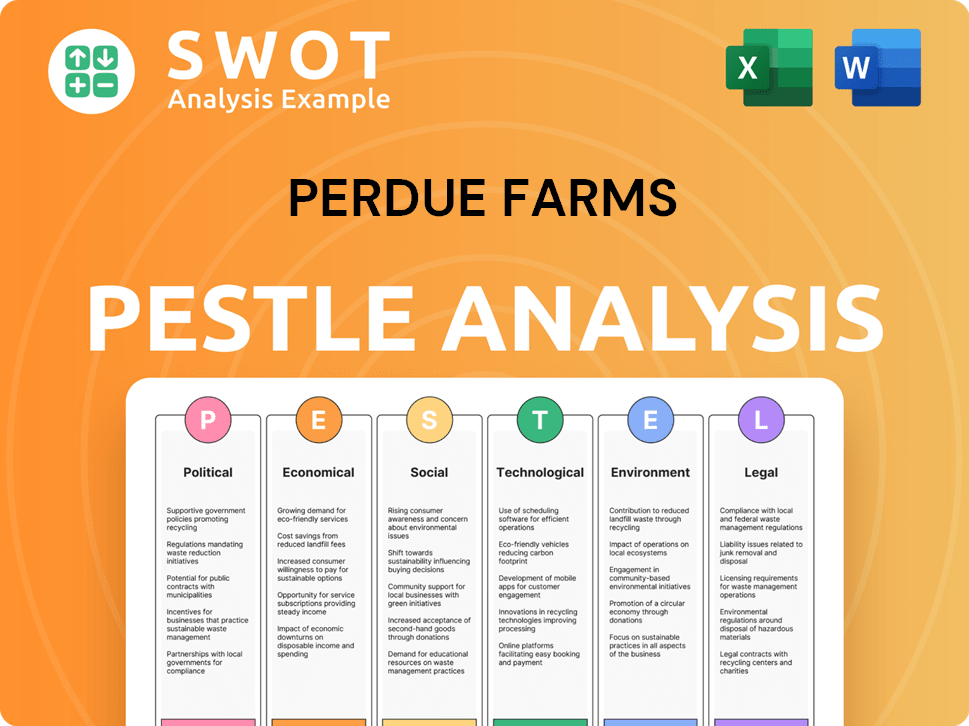
Who Sits on Perdue Farms’s Board?
As a privately held entity, the composition of the board of directors at Perdue Farms is primarily influenced by the Perdue family's ownership and strategic leadership. The exact details of the board's structure are not publicly available. However, it is understood that key members of the Perdue family hold significant positions, ensuring their continued influence over the company's direction. Jim Perdue currently serves as Chairman of Perdue Farms, which highlights the ongoing involvement and oversight of the owning family. The appointment of Kevin McAdams as CEO in 2023 marked a shift, bringing in an external leader to manage day-to-day operations. Strategic control and long-term vision remain guided by the board, where family interests are strongly represented.
The board's decisions likely align with the long-term vision and values of the Perdue family, emphasizing sustainable growth, brand integrity, and responsible agricultural practices. The company's structure, as a private entity, allows for a more focused approach to long-term strategies, unlike publicly traded companies that are subject to quarterly earnings pressures. The Perdue family's substantial ownership translates into dominant voting control, operating on a 'one-share-one-vote' principle. This structure supports the long-term vision and values of the Perdue family. For more insights into the company's operations, you can read about the Revenue Streams & Business Model of Perdue Farms.
| Board Member | Title | Notes |
|---|---|---|
| Jim Perdue | Chairman | Represents the Perdue family's continued leadership. |
| Kevin McAdams | CEO | Leads daily operations, appointed in 2023. |
| Unknown | Board Members | Other board members likely include family members and key executives. |
Perdue Farms operates under private ownership, primarily controlled by the Perdue family. This structure allows for a more direct influence from the Perdue family, ensuring their long-term vision is central to the company's strategy. The board of directors, led by Jim Perdue, guides the company's direction, while the CEO manages daily operations.
- The Perdue family holds the majority of the voting power.
- The board focuses on sustainable growth and brand integrity.
- The company is not subject to the same external pressures as public companies.
- The Perdue family's involvement ensures alignment with their values.
Perdue Farms Business Model Canvas
- Complete 9-Block Business Model Canvas
- Effortlessly Communicate Your Business Strategy
- Investor-Ready BMC Format
- 100% Editable and Customizable
- Clear and Structured Layout
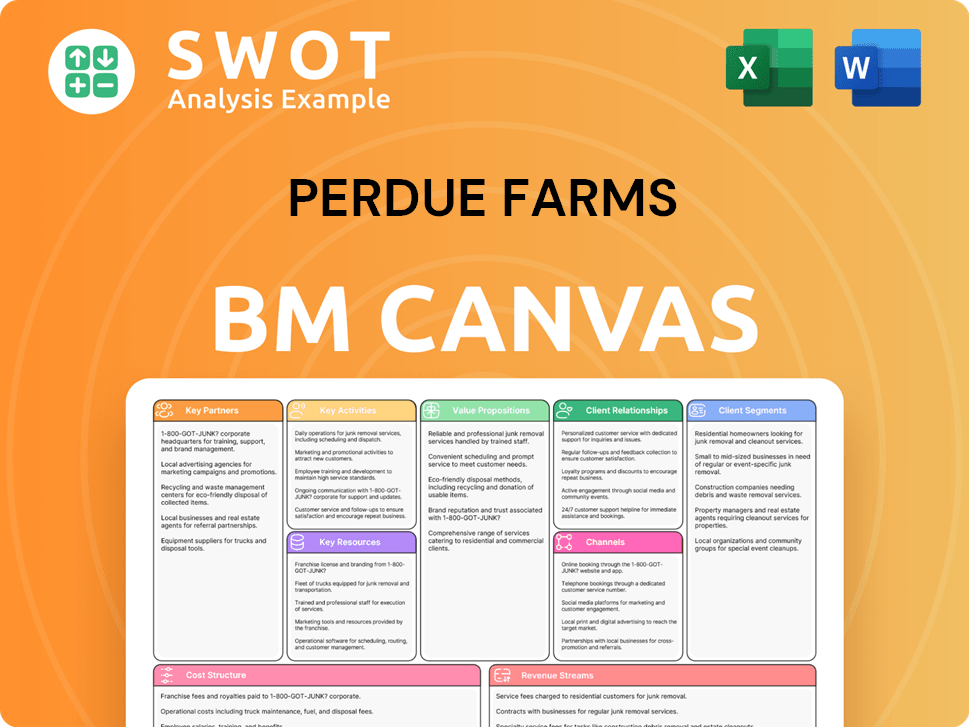
What Recent Changes Have Shaped Perdue Farms’s Ownership Landscape?
Over the past few years, the ownership structure of Perdue Farms has remained consistent, primarily under the control of the Perdue family. Key developments have centered on strategic growth and leadership transitions. Notably, in 2023, Kevin McAdams was appointed as CEO, succeeding Randy Day, marking the first time a non-family member held the position. This shift, however, hasn't altered the family's ownership stake but rather reflects an evolution in operational leadership.
Perdue Farms has actively expanded its presence in sustainable and organic food production. The company has continued to invest in its 'no antibiotics ever' (NAE) and organic poultry lines to meet consumer demand. In 2022, Perdue acquired a majority stake in Pasturebird, a California-based producer of pasture-raised chicken. These strategic moves are possible due to the stable, private ownership structure, allowing for long-term investment decisions without the pressure of public shareholders. For more insights, see the Growth Strategy of Perdue Farms.
| Metric | 2023 | 2022 |
|---|---|---|
| Total Revenue (Estimated) | $10 Billion | $9.5 Billion |
| Number of Employees (Approximate) | 21,000 | 20,000 |
| Organic Poultry Production Growth (Year-over-year) | 12% | 10% |
The appointment of an external CEO signals a move towards professionalizing management, a common trend in large family-owned businesses. The company's focus on acquisitions, like Pasturebird, and expansion into organic and sustainable products, highlights its adaptability to changing market demands. These actions are enabled by its private ownership, which allows for long-term strategic planning.
Kevin McAdams became CEO in 2023, succeeding Randy Day. This marked a strategic shift towards external leadership while Jim Perdue transitioned to Chairman. This change did not impact family ownership.
Perdue has been expanding its organic and sustainable product lines. The acquisition of Pasturebird in 2022 demonstrates a focus on niche markets and diversification.
The acquisition of Pasturebird in 2022 aligns with Perdue's strategy to diversify its product offerings. This strategic move strengthens its position in the market.
The private ownership structure enables long-term investment decisions. This stability allows for a focus on sustainable growth and market adaptation.
Perdue Farms Porter's Five Forces Analysis
- Covers All 5 Competitive Forces in Detail
- Structured for Consultants, Students, and Founders
- 100% Editable in Microsoft Word & Excel
- Instant Digital Download – Use Immediately
- Compatible with Mac & PC – Fully Unlocked
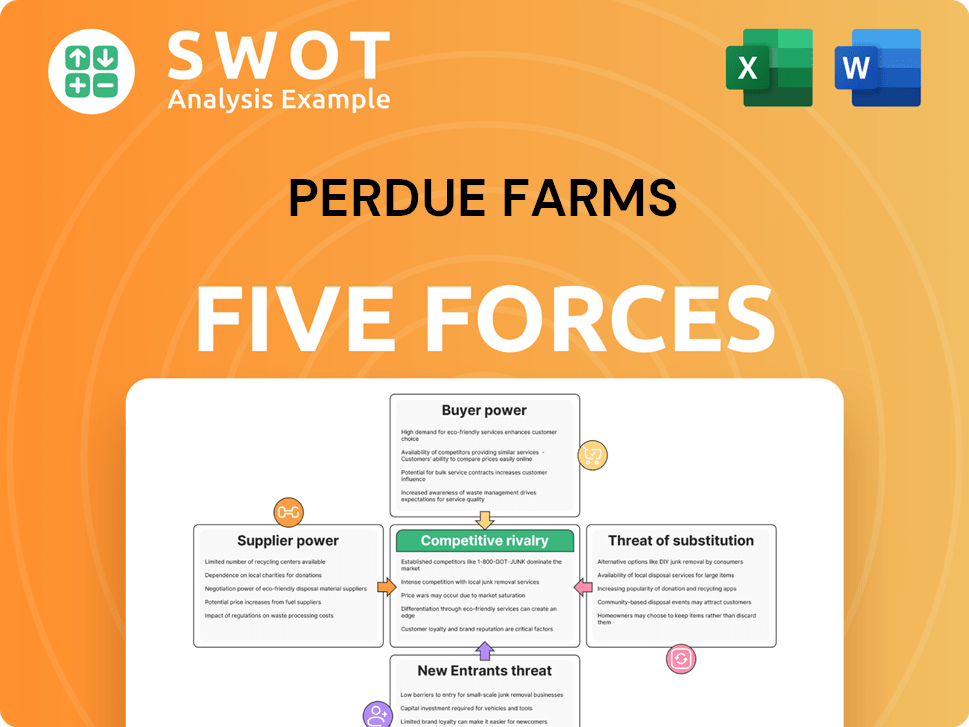
Related Blogs
- What are Mission Vision & Core Values of Perdue Farms Company?
- What is Competitive Landscape of Perdue Farms Company?
- What is Growth Strategy and Future Prospects of Perdue Farms Company?
- How Does Perdue Farms Company Work?
- What is Sales and Marketing Strategy of Perdue Farms Company?
- What is Brief History of Perdue Farms Company?
- What is Customer Demographics and Target Market of Perdue Farms Company?
Disclaimer
All information, articles, and product details provided on this website are for general informational and educational purposes only. We do not claim any ownership over, nor do we intend to infringe upon, any trademarks, copyrights, logos, brand names, or other intellectual property mentioned or depicted on this site. Such intellectual property remains the property of its respective owners, and any references here are made solely for identification or informational purposes, without implying any affiliation, endorsement, or partnership.
We make no representations or warranties, express or implied, regarding the accuracy, completeness, or suitability of any content or products presented. Nothing on this website should be construed as legal, tax, investment, financial, medical, or other professional advice. In addition, no part of this site—including articles or product references—constitutes a solicitation, recommendation, endorsement, advertisement, or offer to buy or sell any securities, franchises, or other financial instruments, particularly in jurisdictions where such activity would be unlawful.
All content is of a general nature and may not address the specific circumstances of any individual or entity. It is not a substitute for professional advice or services. Any actions you take based on the information provided here are strictly at your own risk. You accept full responsibility for any decisions or outcomes arising from your use of this website and agree to release us from any liability in connection with your use of, or reliance upon, the content or products found herein.